Summer Reading List: 5 Books for Leaders
Latest Posts
- 2024 Reading List for Leaders
(posted: 07/01/2024)The right book can be a leadership game-changer.
- Coach's Notebook: Exec Presence for Leaders
(posted: 05/08/2024)As a leader your charisma is critical. Learn how to develop it!
- New Year's Resolutions vs New Chapters
(posted: 02/01/2024)Forget New Year's...Your new chapter can begin when you are ready!
Blog Archives
Kristi posts to her site about once a month, but frequently more often. She also appears as a featured contributer on select other sites. If you would like to be notified when new blogs are posted, please subscribe to our newsletter.
If you are interested in Kristi guest posting to your site feel free to contact us.
Summer Reading List: 5 Books for Leaders
(posted: June 5th, 2017)

[Any links in this post are provided as a courtesy to the reader. The reviews are my own opinions, all of the books were purchased, and I do not receive any kind of compensation if you click on a link!]
Successful leaders are also avid readers.
Did you know? Regular reading is important for your health! It may slow the normal, age-related decline in brain function, keeping your mind sharper, longer. Reading makes you smarter, gives your memory a workout, may help fight Alzheimer's disease, and it can reduce stress by 68%.
Summertime is a great time to dive into some long-form reading to boost your internal and external leadership skills. The pace of work, and life, slow down a bit. Grabbing a fast-paced beach (or airport) novel is a great option for relaxing and tuning out, but I'm partial to the inspiring, challenging and informative reads you find in non-fiction business books.
This year the books on my list are focused on developing your inner leader, with titles on positivity, resilience, and your own presence and charisma, among others.
Are you ready to use your reading time this summer to brush up on your leadership skills and personal growth? Then take a look at my list of 5 summer reads.
Leaders: 5 Books for Your Summer Reading List
1) Option B: Facing Adversity, Building Resilience, and Finding Joy, by Sheryl Sandberg and Adam Grant
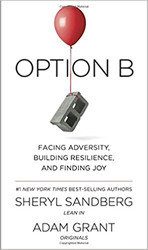
What it's about: We've all faced difficult times in our lives when we thought things might never improve. This collaboration uses Sheryl Sandberg's personal story and insights to illustrate Adam Grant's research on handling adversity.
Hundreds of studies have shown that all of us, children and adults, recover faster when we realize that hardships are not entirely our fault, don’t affect every aspect of our lives, and won’t follow us everywhere, forever.
What you'll learn: Resilience comes from deep within us and from support outside us. Even after the most devastating events, it is possible to grow by finding deeper meaning and gaining greater appreciation in our lives. Some of what you'll find in Option B:
- Resilience-strength in the face of adversity-can be learned and developed.
- Joy is a discipline, but it's also something we all deserve. Paying attention to moments of joy takes effort because we are wired to focus on the negatives more than the positives, but it's worth it.
- Think about how you contribute each day, writing down what went well and why. The act of reviewing what went well builds our confidence by reminding us that we can make a difference.
- Cultivating hope and gratitude helps us to "bounce forward".
- How to help your kids become resilient.
- The importance of making it safe to make mistakes and ask for feedback at work.
Option B illuminates how to help others in crisis, develop compassion for ourselves, raise strong children, and create resilient families, communities, and workplaces. Many of these lessons can be applied to everyday struggles, allowing us to brave whatever lies ahead.
2) How to Have a Good Day: Harness the Power of Behavioral Science to Transform Your Working Life, by Caroline Webb
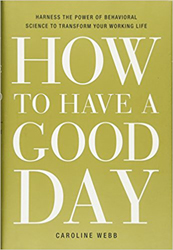
What it's about: In this book, economist and former McKinsey partner Caroline Webb shows us how to use research from behavioral economics, psychology, and neuroscience to transform our approach to everyday working life.
Webb suggests that with a few minutes of mental preparation we can shift the way we experience the day, making it more productive and enjoyable. Our brains save energy by running on autopilot when they can, and tend to prioritize information related to whatever is top of mind. So, deliberately choose what you are thinking about and your brain will continue to focus on that.
What you'll learn: There is much in this book that can be applied to all aspects of our lives. The author shows us how to use these tactics at work, including handling conflict with colleagues and invigorating dull meetings, but I've found that the exercises can also be applied to improve presentation skills!
Just a handful of nuggets from the book:
- Start your day by determining your Aim, Attitude and Attention for the day.
- Frame your goals for the day by asking yourself what positive outcome you'd like to see, and what you need to do more of to achieve that ideal end.
- What is most likely to get in the way of meeting those goals today? Visualize that obstacle and how you will handle it with ease.
- Take downtime throughout your day to maintain your energy levels.
- Negative emotions get our attention very quickly, but we are much more likely to adopt ideas or propositions that are framed from the positive side.
- Use human and emotional choices, in your phrasing and as examples, because they grab us and make us pay attention.
- In groups, when you need to see all the possibilities, invite everyone to be a devil's advocate and share different perspectives. You'll make better decisions.
How to Have a Good Day is one of those rare treasures that is filled with actual how-tos, exercises and tactics you can apply to your situation, at work or at home, and see the results of your efforts right away.
3) The Happiness Advantage: The Seven Principles of Positive Psychology That Fuel Success and Performance at Work, by Shawn Achor
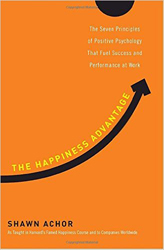
What it's about: Happiness as a competitive advantage? Yes! We tend to believe that when we are more successful, we’ll be happy. But discoveries in positive psychology have shown that happiness fuels success, not the other way around. When we are positive, our brains become more engaged, creative, motivated, energetic, resilient, and productive at work. This is backed up by rigorous research in psychology, neuroscience and management studies, and it's seen in the bottom lines of organizations around the world.
What you'll learn: We can't control the pressure and stress that come at us, but we can control our state of mind.
- Happiness is a choice.
- Even high driving individuals, e.g., attorneys in tax season, were able to use the happiness advantage to reduce stress and achieve more in their academic and professional lives.
- The book gives you the research so that you will understand how the principles of positive psychology can work in your career and the workplace.
- A set of 7 tools that help you apply the principles you've learned.
Change is possible:
- It is comforting to know that people can become happier, that pessimists can become optimists, and that stressed and negative brains can be trained to see more possibility. This is available to all who put in the effort.
- Happiness is not just a mood, it is a work ethic.
I've taken some of these tactics into my family life as well; for example, each night at dinner we all share three things we are grateful for.
4) Executive Presence: The Missing Link Between Merit and Success, by Sylvia Ann Hewlett
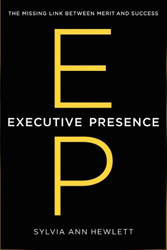
What it's about: It's hard to describe, but we all know when we're in the presence of someone who has it. It's an intangible something, an "It" factor, that makes one person seem authoritative and leader-like while another, in a similar position with similar credentials, does not. This book breaks down the components that make up executive presence to help you understand it and develop it for yourself.
What you'll learn: Hewlett describes executive presence (EP) as, "[a] heady combination of confidence, poise, and authenticity that convinces the rest of us we're in the presence of someone who's the real deal."
It's an intangible thing that we have trouble defining, but the author determined that EP has three primary components:
- How you act (gravitas)
- How you speak (communication)
- How you look (appearance)
They are not equal in weight or importance. 67% of senior executives said that gravitas, projecting confidence and grace under fire, was the most important component in EP. However, the other two, communication and appearance, are critical to displaying gravitas.
Your ability to communicate well, your speaking skills, let people know that you have gravitas, and one of the most important pieces of communicating well is eye contact.
As for your appearance, colleagues, peers, direct reports, and clients size up your competence, likability and trustworthiness in just 250 milliseconds, based on your appearance.
Hewlett goes into greater detail, helping the reader understand what executive presence is, and why and how to cultivate it. There is information here that you can use in your everyday life, in your work, and in developing your public speaking skills!
5) Being the Boss: The 3 Imperatives for Becoming a Great Leader, by Linda A. Hill and Kent Lineback
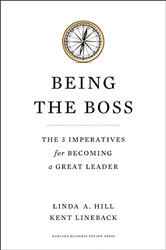
What it's about: To be an effective manager you have to be willing to pursue personal learning, and to change. This book helps you assess your current abilities as a manager and give you the tools and strategies to become the great boss you want to be, and that your organization needs you to be.
What you'll learn: When you move from individual contributor to manager you have to shift your perspective. Many new managers have difficulty recognizing that their new role is no longer so much about doing the work as it is about delegating, influencing and inspiring their direct reports. Becoming a manager requires so much personal development that it is truly a transformation, similar to major life events like leaving home, finishing school, beginning a career, getting married, or having a child. It really does demand that you reconsider such huge questions as: who am I, what do I want, and what value do I add?
To effective manage others, you must make a difference in the thoughts and feelings that drive their actions, as well as the actions themselves. The book rest on three imperatives for managers:
- Manage yourself: how you think about yourself and your role, how you relate to others in this role, and how you influence others.
- Manage your network: working effectively in political environments.
- Manage your team: building a high performance team that is more than the sum of its parts.
The authors offer great suggestions for developing your management ability, if you are ready and willing to do the work.
Summer Reading for Personal Development
Even if you only read one book off the list, I know that you will find yourself energized, inspired and ready to conquer your world! Of course, if you are hungry for more great leadership reads, drop me a line. I have many more suggestions and I am always thrilled to share.
- Have you read any of the books on my list? If so, what were your key takeaways?
- What title would you add to the list?
- What else is on your reading list this summer?
- What different tactics do you use to incorporate possitivity into your day, or to increase your happiness?
Have you read the Secrets of Great Presentations Series?
- Part 1 - Understanding Your Audience in 5 Steps
- Part 2 - Secrets of Great Presentations: 6 Ways to Structure a Compelling Talk
- Part 3 - Secrets of Great Presentations, Storytelling: Why Tell Stories?
- Part 4 - Secrets of Great Presentations, Storytelling: Where to Find Stories
- Part 5 - Secrets of Great Presentations, Storytelling: How to Tell a Story
Sign Up for our newsletter and never miss another post.
